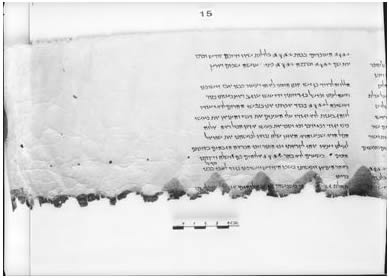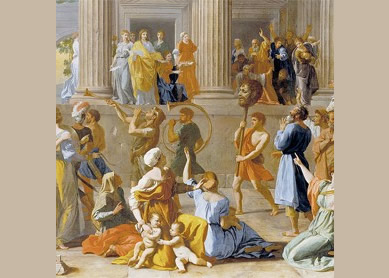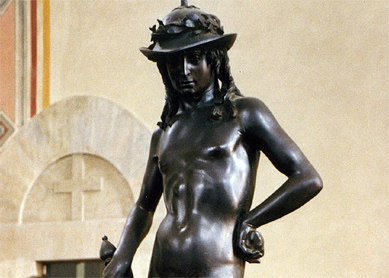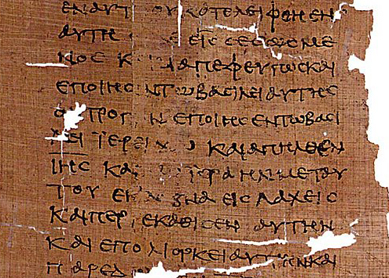Where did Psalm 151 come from and whose Bible is it in?
If you were to look for Psalm 151 in your Bible you probably would not find it. It is not in Jewish, Roman Catholic, or Protestant Bibles, though it is in some Eastern Orthodox Bibles. Why? It was in the earliest Greek translations of the Old Testament, but when Jerome translated the Psalter into Latin in the 4th century C.E., he used the Hebrew Masoretic text of the Old Testament, which did not include Psalm 151.
Psalm 151 has been known for centuries in translation—in Greek, Old Latin, and Syriac (Christian) Bibles—but it was not included in the traditional (Hebrew) Jewish Bible that Jerome used. Greek translations of the biblical Psalter in antiquity included Psalm 151 even before the early churches adopted Psalms as their (First or) Old Testament hymn book, but Greek Psalm 151 (and its Syriac translation) was, we now know, a combination of two original poems.
The Hebrew originals were discovered among the Dead Sea Scrolls, unrolled in November 1962 for the first time in about two thousand years. In the last column of the large Psalms Scroll found in Cave Eleven at Qumran, Psalm 151A appears in its entirety and celebrates in poetry David’s selection as king by the prophet Samuel from among the sons of Jesse in Bethlehem. That is the story we read in 1Sam 16. The fragmentary Psalm 151B celebrated the young David’s victory over Goliath the Philistine (as told in the following chapter 17). The early Greek translation combined the two psalms into one, whose first five verses reflect chapter 16 of 1 Samuel, and the last two chapter 17.
Psalm 151 in Greek Psalters reads as follows:
Why are there different versions of Psalm 151?
Greek Psalm 151 was not a simple combination of the two psalms we now see in the scroll but an edited version. It lacks some essential elements that are in the original Hebrew and rearranges a few phrases in the Greek version verses 4 and 5. You can see this by comparing the psalm to the story in 1 Samuel. Psalm 151 shortens the story of Samuel’s choosing David in order to merge the two poems.
But the most interesting change is that the Greek version omits six phrases from the original Hebrew. (Consequently, the Old Latin and Syriac translations also lack them.) The six phrases, omitted in the Greek translation, appeared in the original between verses 2 and 3 to read:
The six phrases in the original made up one and a half verses and depict David as being as gifted and talented a musician as the Greek god, Orpheus. So the original psalm offered a Jewish response to Greek influence of the time by bragging: our David could beat Orpheus in music any day! It was a typical Jewish response of the time to foreign influence—not by adopting Orphism, but by refuting it in terms that could be understood. Mountains and hills cannot praise God, the phrases claim, but trees and flocks cherished David’s music that praised God so beautifully.
Jewish arguments of this sort were common in Hellenistic Jewish literature and this same argument showed up later in mosaics depicting David as Orpheus wearing the Orphic headdress and strumming a lyre. The reason they were omitted in the Greek version was because orthodox Jewish communities out in the Greco-Roman world where Orpheus was still worshipped might have been offended. Numerous efforts to read the phrases differently have not been convincing.
Whichever version one reads, Psalm 151 lifts in relief the moving story of David’s selection by Samuel and his victory over the Philistines as epitomized in his slaying Goliath. That victory anticipates his reign over the United Kingdom of northern Israel and southern Judah in the tenth century BCE. Whether in two parts or amalgamated, the psalm comes last in the various Psalters in which it appears. Perhaps it gained its place at the climax of the Psalter because of the growing belief at the time that David was responsible for the entire Psalter, whether he actually composed all of the psalms or not.
Bibliography
- Flint, Peter W. The Dead Sea Psalms Scrolls and the Book of Psalms. Leiden: Brill, 1997.
- Sanders, James A. The Dead Sea Psalms Scroll. Ithaca, N.Y.: Cornell University Press, 1967, especially pp. 888-89, 94-112.
- Sanders, J. A. Discoveries in the Judaean Desert. Vol. 4, The Psalms Scroll of Qumrân Cave 11. Oxford: Clarendon, 1965.
- Reymond, Eric D. New Idioms Within Old: Poetry and Parallelism in the Non-Masoretic Poems of 11Q5 (=11QPsa). Atlanta: Society of Biblical Literature, 2011.
- Charlesworth, James H., and James A. Sanders. “More Psalms of David.” Pages 609-24 in The Old Testament Pseudepigrapha. Edited by James H. Charlesworth. Vol. 2. New York: Doubleday, 1983-1985.




